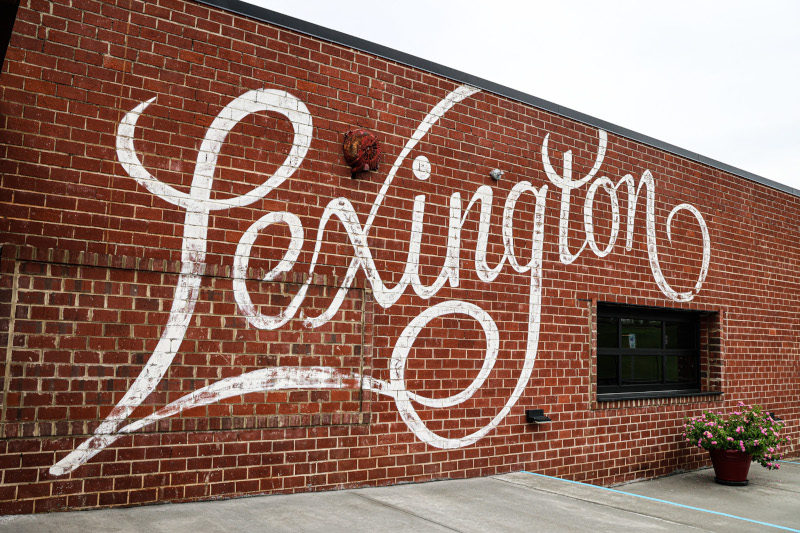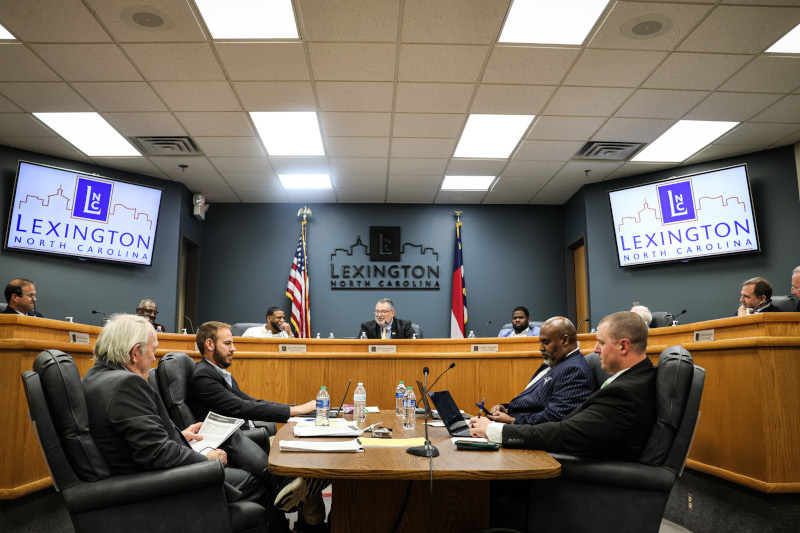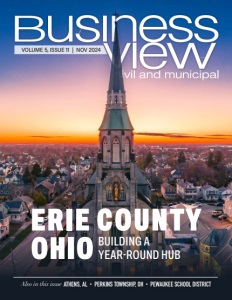Lexington, North Carolina
Roots of Revival
Transforming to meet its future community and economic goals
Lexington, North Carolina, a city once renowned for its textile and furniture manufacturing, is transforming significantly while proudly holding its title as the “Barbecue Capital of the World.” Famous for its unique Lexington-style barbecue, which draws visitors from far and wide, the city’s annual Barbecue Festival has become a key cultural event celebrating its culinary traditions.
While the decline of traditional industries in the late 20th century impacted its economy, Lexington is now on the path to revitalization under the leadership of Mayor Jason Hayes. With an emphasis on economic diversification, sustainable initiatives, and the preservation of the community’s rich heritage, Hayes’ vision is reshaping Lexington into a thriving hub of growth and opportunity—without losing the small-town charm and traditions that make it a welcoming place to live, work, and visit.
Lexington is a small town with a big heart, Hayes proudly states. His passion for his hometown is unmistakable as he reminisces about the city’s past and the evolving present. Hayes’ history with Lexington is deeply personal: he grew up here, attended local schools, and watched the city undergo major changes. “My parents moved here in 1965 and worked in the furniture factories,” Hayes recalls. “Watching the evolution of this city, from its industrial roots to where we are now, is incredibly gratifying for me.” Yet, he acknowledges Lexington’s challenges, particularly the loss of major industries in the 1990s, which decimated the local economy. “We’ve been clawing our way back for decades,” Hayes admits. But that hard work is now starting to pay off in big ways.

Economic revival: a new chapter
The turning point for Lexington’s economy came in the last five years, thanks to a diverse range of new businesses and industries setting up shop in the city. Hayes is enthusiastic about the influx of manufacturing, steel, and food players, noting how they create new jobs and stimulate growth. One such company is Egger Wood Products, an Austrian firm now employing 700 people in the area. “They’ve been a key part of our economic revival,” Hayes explains. Another important addition is Nucor Steel, which invested a whopping $400 million into the region, creating 200 jobs. The sheer scale of these investments is driving unprecedented growth in the city.
However, the most exciting development in Hayes’s eyes is the arrival of Siemens Mobility, a global giant in rail transport. “We’re going to be in the train business,” he says excitedly. Siemens Mobility has committed to a $220 million investment in Lexington, where they will begin production of passenger rail cars, creating over 500 jobs in the next four years.
“This is a game-changer for us,” Hayes says, noting that the project aligns perfectly with the city’s broader plans to revitalize its infrastructure, particularly the Depot District. Siemens’ arrival coincides with Lexington’s plans to restore its passenger rail service, a historic feature of the city being brought back with federal and state funding. The return of rail service will not only make Lexington more accessible but will also drive economic activity in the city’s historic uptown area.
“We’re seeing the trajectory now where industry brings jobs, jobs bring residential growth, and that brings retail and services,” Hayes elaborates. He cites examples of retail chains and mom-and-pop businesses flocking to Lexington to capitalize on the city’s newfound vitality. “It’s fun to see,” he adds, reflecting on the transformation.
A housing boom
A key factor driving Lexington’s revival is the growth in housing. For years, development in Davidson County took place mainly outside the city limits, leaving Lexington behind. “Before 2018, we had maybe 100 building permits for new homes,” Hayes notes. “That’s just not substantial for a city like ours.” Today, that picture has dramatically changed. Hayes points out that Lexington has now approved nearly 1,500 new homes to be built, ranging from single-family homes to multifamily residential complexes. “We’re seeing housing growth all over the city, not just in one area,” he says. This boom reflects the city’s broader economic resurgence as businesses and workers seek housing close to new jobs and amenities.
The transformation is perhaps most evident in the Depot District, an area once dominated by furniture manufacturing. When Lexington Home Brands left in the 2000s, the city purchased the vacant buildings in 2009, hoping to spur revitalization. For years, progress was slow, but recent developments have turned the district into a vibrant hub of activity. “We now have an amphitheater, event centers, and locally owned businesses like Goose and the Monkey Brewery and Bull City Cider,” Hayes says. These new attractions are complemented by housing developments, with multifamily units already under construction. The district has become a symbol of Lexington’s ability to blend its historical roots with modern development.

Biogas and green initiatives
In addition to the influx of new industries, Lexington is positioning itself as a leader in sustainability. One of the most innovative companies that recently chose Lexington is Divert, which specializes in converting food waste into biogas. “From an environmental standpoint, this is a really sexy opportunity for us,” Hayes chuckles. “It’s sustainable, forward-thinking, and something that Europe has been doing for a while, but we’re now getting on board here in the U.S.”
Divert’s operations involve collecting expired and late-dated produce from grocery stores, which is then converted into biogas at its Lexington facility. As a natural gas municipality, Lexington will purchase this biogas to provide to its customers and sell on the open market. “It’s a $100 million investment and will create over 60 jobs,” Hayes notes, indicating that this project is both an environmental win and an economic boon for the city.
This emphasis on sustainability is central to Hayes’ vision for Lexington’s future. “We’re trying to attract industries that not only provide jobs but also align with our values as a community,” he says. The biogas project is just one example of how Lexington is thinking about long-term growth in a way that benefits both the economy and the environment.
Investing in infrastructure
With new industries and residents comes the need for infrastructure supporting Lexington’s growth. As Hayes points out, Lexington’s ability to provide water, sewer, electricity, and natural gas has given it a competitive edge in attracting new businesses. “We’re one of 19 consortium cities in North Carolina that provide electric utility services,” he explains. “This allowed us to offer Siemens Mobility the reliable power they need for their operations.”
Lexington is also investing heavily in road improvements. “Road paving isn’t glamorous, but essential,” Hayes says. “We’ve increased spending significantly on road surfacing to ensure that our streets can handle the growth we’re experiencing.”** This focus on infrastructure is critical not only for industrial growth but also for the quality of life for Lexington’s residents.
Hayes is firmly committed to enhancing the quality of life for all Lexington residents, ensuring that everyone benefits from the city’s growth. The Parks and Recreation Department oversees more than 20 parks, offering abundant opportunities for outdoor activities. “We also have an amphitheater in the Depot District, where we host performances throughout the year,” Hayes notes. “This is part of a public-private partnership with Breeden Insurance and the Chamber of Commerce, playing a key role in our efforts to make Lexington a more vibrant and livable community.”
One of Hayes’ proudest projects is the redevelopment of Dunbar High School, a historically significant building for Lexington’s African American community. “Dunbar was built in 1951 as a segregated school for Black students,” Hayes explains. After desegregation, the school was repurposed as an intermediate school but has since fallen into disrepair. Working with a private developer, the city plans to convert the building into market-rate apartments while preserving its historical significance. “The developer will renovate the gym and auditorium, creating community spaces that all our residents can use,” Hayes says. “This project is about honoring our past while looking forward to the future.”
Creating a welcoming city
As Mayor Jason Hayes looks ahead to the next five to ten years, his vision for Lexington is clear: “We have to grow to maintain our vibrancy and vitality,” he says. “We’re on the precipice of significant growth and opportunity, and every day, I think about how we can continue to build on that momentum.”
For Hayes, growth is about more than just economic development—it’s about creating a city where everyone feels welcome and has the opportunity to thrive. “I want Lexington to be a place where people want to live, work, and visit,” he says. “And I believe we’re getting there.”
With new industries like Siemens Mobility and Divert leading the way and ambitious housing and infrastructure projects in the works, Lexington is becoming a destination for businesses, residents, and visitors alike. As Hayes says, “We’re spreading the love in many different areas, trying to make Lexington a place where everyone feels like they belong.”
AT A GLANCE
Who: Mayor Jason Hayes
What: A growing city in Davidson County with a strong history in manufacturing, particularly in the furniture and textile industries.
Where: Located in Davidson County, North Carolina, in the Piedmont Triad region, between the larger cities of Winston-Salem and Greensboro.
Website: https://www.lexingtonnc.gov/
PREFERRED VENDORS
North Carolina Railroad Company – www.ncrr.com
NCRR is the one private railroad company that has driven North Carolina’s economic growth for over 175 years. We maintain our rail corridor that serves as the state’s essential conduit, provide dynamic services and best-in-class rail-centric solutions, and transform our trusted expertise and unique assets into economic advantages.
Siemens – mobility.siemens.com
Siemens Mobility is the Unites States’ largest passenger rolling stock manufacturer with 4,500 team members and a network of more than 2,000 suppliers in America. Our $220 million expansion to Lexington, NC will create 500 new jobs and bring an advanced manufacturing and rail services facility to the east coast.
Lexington Area Chamber of Commerce – https://www.lexingtonchamber.net
The Lexington Area Chamber of Commerce is a collection of leaders, innovators, business pioneers, and community champions, who work together to create a vibrant and connected local economy. We support local businesses and organizations by providing resources, networking opportunities, and advocacy to help them thrive. We are proud to support the ongoing efforts of the City of Lexington to expand and develop our business community. Their efforts have laid a strong foundation, and painted a bright future for our city. We’re honored to be partners in this success and look forward to watching Lexington as it continues to grow and thrive.







